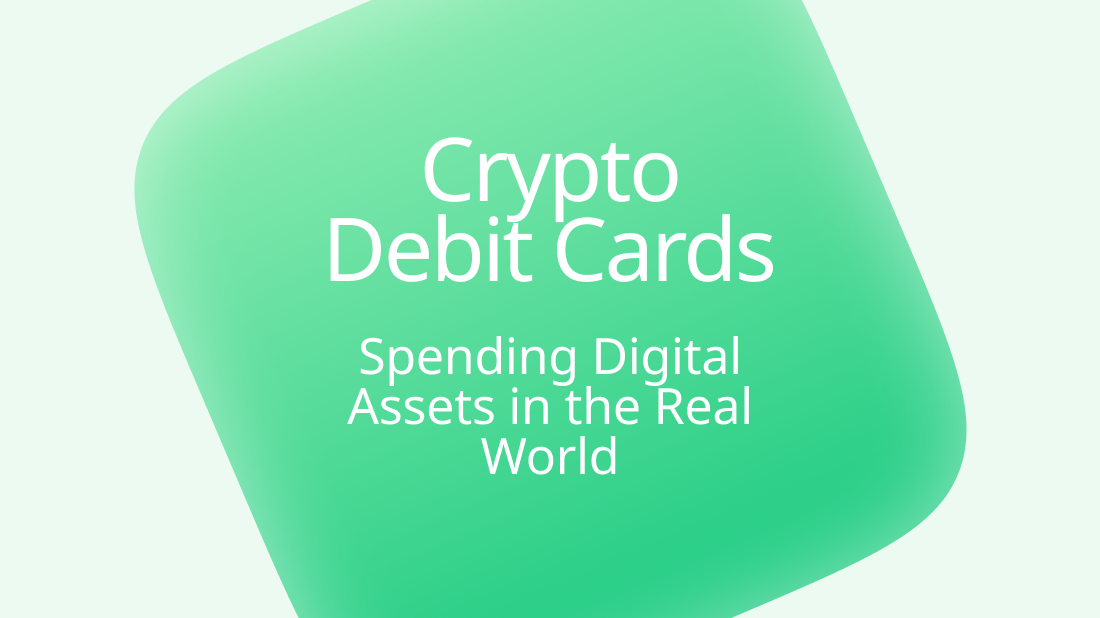Crypto Debit Cards: Spending Digital Assets in the Real World

Cryptocurrency has evolved from being a niche investment to a widely accepted form of digital currency. One of the most significant developments in this space is the emergence of crypto debit cards, which allow users to spend their digital assets just like traditional fiat currencies. These cards bridge the gap between the digital and physical worlds, enabling everyday transactions using cryptocurrencies. In this article, we will explore the functionality of crypto debit cards, how they work, and their benefits for everyday transactions.
Understanding Crypto Debit Cards
What Are Crypto Debit Cards?
Crypto debit cards are payment cards that allow users to spend their cryptocurrency holdings in the real world. They work similarly to traditional debit cards issued by banks, but instead of drawing funds from a fiat currency bank account, they draw from a cryptocurrency wallet. These cards are typically issued by cryptocurrency exchanges, fintech companies, or specialized crypto card providers and can be used at any point-of-sale (POS) terminal that accepts regular debit or credit cards.
How Do Crypto Debit Cards Work?
When you use a crypto debit card to make a purchase, the transaction process is slightly different from that of a traditional debit card. Here’s a step-by-step breakdown:
- Funding the Card: To use a crypto debit card, you need to load it with cryptocurrency from your digital wallet. Depending on the card provider, you may be able to load Bitcoin, Ethereum, Litecoin, or other supported cryptocurrencies.
- Conversion to Fiat Currency: When you make a purchase, the card provider automatically converts the required amount of cryptocurrency into fiat currency (such as USD, EUR, or GBP) at the current exchange rate. This conversion happens in real-time at the moment of the transaction.
- Transaction Approval: After the conversion, the fiat currency amount is deducted from your card balance and used to complete the transaction. The merchant receives the payment in their local currency, just like with a traditional debit card.
- Spending and Limits: Crypto debit cards typically come with spending limits, which can vary based on the card provider, the level of verification you have completed, and the specific cryptocurrency being used.
Types of Crypto Debit Cards
There are two main types of crypto debit cards:
- Prepaid Crypto Debit Cards: These cards require you to load a specific amount of cryptocurrency onto the card in advance. Once loaded, the funds are held in a fiat currency balance on the card, ready to be spent. This type of card offers more stability, as the conversion rate is locked in when you load the card.
- Real-Time Conversion Crypto Debit Cards: These cards do not require you to pre-load fiat currency. Instead, they convert cryptocurrency to fiat currency in real-time at the point of sale. This allows you to hold onto your crypto assets until the moment you make a purchase, potentially benefiting from price appreciation.
Benefits of Crypto Debit Cards
Convenience in Everyday Transactions
One of the most significant benefits of crypto debit cards is their convenience. They allow you to spend your digital assets directly at millions of merchants worldwide, both online and offline. Whether you’re buying a cup of coffee, shopping for groceries, or paying for travel, crypto debit cards make it easy to use your cryptocurrency for everyday transactions.
Instant Conversion and Accessibility
Crypto debit cards eliminate the need to manually convert cryptocurrency to fiat currency before making a purchase. The instant conversion process means you can spend your digital assets at any time without the hassle of pre-conversion, making cryptocurrency more accessible for everyday use.
Global Acceptance
Most crypto debit cards are issued by major payment networks like Visa or Mastercard, which means they are accepted anywhere these networks are supported. This global acceptance is a significant advantage for cryptocurrency users who want to spend their digital assets internationally without worrying about currency exchange rates or carrying cash.
Rewards and Cashback Programs
Many crypto debit cards offer rewards and cashback programs, similar to traditional credit cards. These rewards can be particularly appealing, as they often provide cashback in cryptocurrency rather than fiat currency. For example, some cards offer a percentage of your spending back in Bitcoin or other cryptocurrencies, allowing you to accumulate more digital assets as you spend.
Financial Privacy and Control
Crypto debit cards offer an added layer of financial privacy, as they are not directly linked to a bank account. This can be beneficial for users who value privacy and want to maintain control over their financial information. Additionally, because crypto debit cards are often linked to decentralized wallets, users have more control over their funds and can avoid some of the restrictions imposed by traditional banks.
Challenges and Considerations
Volatility of Cryptocurrency Prices
One of the main challenges associated with crypto debit cards is the volatility of cryptocurrency prices. The value of cryptocurrencies can fluctuate significantly in a short period, which can affect the purchasing power of your digital assets. For example, if the price of Bitcoin drops sharply after you load your card, the fiat value of your funds may decrease, reducing your spending power.
Fees and Conversion Rates
Crypto debit cards often come with fees, including transaction fees, foreign exchange fees, and conversion fees. These fees can vary depending on the card provider and the type of transaction. Additionally, the conversion rates offered by card providers may not always be favorable, meaning you might lose a small percentage of your funds during the conversion process.
Regulatory and Compliance Issues
As with any financial product, crypto debit cards are subject to regulatory and compliance requirements. Depending on your location, there may be restrictions on the use of crypto debit cards, or you may need to complete additional verification processes to comply with anti-money laundering (AML) and know your customer (KYC) regulations. It's important to be aware of these requirements before using a crypto debit card.
Limited Cryptocurrency Support
Not all cryptocurrencies are supported by crypto debit cards. While major cryptocurrencies like Bitcoin, Ethereum, and Litecoin are commonly accepted, smaller or less popular digital assets may not be supported. This can limit your ability to spend certain cryptocurrencies directly using a debit card.
The Future of Crypto Debit Cards
As the cryptocurrency market continues to evolve, so too will the functionality and availability of crypto debit cards. Advances in fintech and blockchain technology are likely to lead to more innovative features, lower fees, and greater integration with traditional financial systems. In the future, we may see crypto debit cards that support a wider range of digital assets, offer more robust rewards programs, and provide enhanced security features.
Moreover, as regulatory frameworks around cryptocurrencies become more defined, crypto debit cards could become a more mainstream financial product, further bridging the gap between digital and traditional finance.
Conclusion
Crypto debit cards represent a significant step forward in the adoption of digital currencies for everyday use. By offering a convenient, accessible, and globally accepted way to spend cryptocurrencies, these cards make it easier than ever to integrate digital assets into your daily financial life. While there are challenges to consider, including volatility and fees, the benefits of crypto debit cards make them an attractive option for anyone looking to spend their cryptocurrency in the real world. As fintech and blockchain technology continue to advance, crypto debit cards are poised to play an increasingly important role in the future of digital payments.











